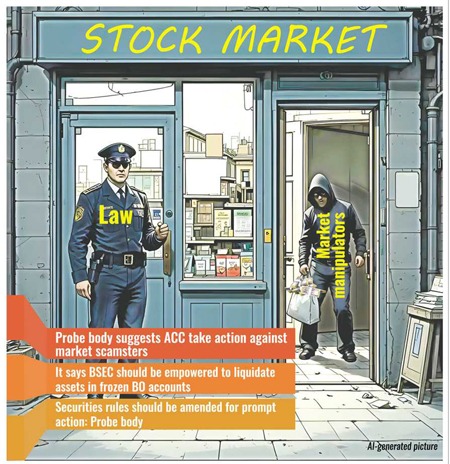Investigators highlight flaws in securities rules, propose reforms

Published :
Updated :

The committee formed after the fall of the previous government to probe stock market frauds has shed light on shortcomings in the securities rules, which seemed to have protected manipulators instead of investors.
The most obvious outcome is the legal challenges that the Bangladesh Securities and Exchange Commission (BSEC) faces while trying to realise fines imposed on wrongdoers.
A very common practice of the market watchdog against manipulators is to levy fines, but in most cases such actions end up stuck in legal tangles.
The securities and exchange ordinance does not permit the regulator to take prompt actions.
The accused get three months' time to submit an application to the commission seeking a "revision" of the regulatory decision. Irrespective of whether the accused have made a plea or not, they, upon the expiry of the duration, get another six months to make an appeal for a review of the penalty.

"The hands of the regulator are tied [because of the rules]. That's why the inquiry committee suggested the securities regulator reduce the time given for review and appeals," said a source close to the probe body.
The securities rules also allow the court to hand down a maximum jail term of five years and a maximum penalty of Tk 0.5 million.
These limitations are the reason why the probe body recommended forwarding reports on its findings to the Anti-Corruption Commission (ACC), which has a wider scope to ensure punishment of wrongdoers, and the law it navigates provides for stricter penalties.
Besides, many of the individuals alleged to have been involved in market scams are also accused of corruption and money laundering under investigation by the ACC. Therefore, the BSEC investigation reports are believed to strengthen legal actions by the ACC.
"None of the [stock market] scamsters responsible for the 1996 and 2010 market crashes could be punished because of the existing limitations in the securities rules," the source said, wishing not to be named.
BSEC spokesperson Md. Abul Kalam said the BSEC followed due process in line with the securities rules before forwarding the reports.
The committee has so far submitted 12 reports to the securities regulator as per the terms of reference (ToR) set for the investigation.
Before forwarding any report to the ACC, the accused are given an opportunity to present arguments in self-defense at BSEC hearings, said Mr. Kalam.
In September 2024, the BSEC formed a five-member inquiry committee to probe stock market irregularities, including allegations surrounding the issuance of Beximco Green Sukuk Bond and IFIC Granted Sreepur Township Green Zero Coupon Bond, and frauds linked to nine listed companies.
Following the committee's suggestion, the securities regulator has sent some reports to the ACC for action.
Last week, the BSEC urged the ACC to move against top officials of ACME Pesticides for allegedly receiving the company's placement shares without paying money.
The regulator also forwarded another investigation report to the ACC and the finance ministry on the involvement of Investment Corporation of Bangladesh (ICB) officials in manipulating Fortune Shoes' stock price.
In its report, the inquiry committee recommended addressing limitations in the securities rules.
It also suggested that companies which have remained non-functional be brought back into operation so that investors get returns on their investments.
Investigators further believe that the BSEC should be empowered to liquidate assets to settle investors' claims.
Under the existing system, regulators can freeze the bank and BO (beneficiary owner's) accounts of those found responsible for misconduct. But there is no scope to liquidate assets in the portfolios of market manipulators.
The committee suggested incorporating a provision in the securities rules to enable liquidation of assets in frozen BO accounts to settle claims.
Such a provision exists in neighbouring India. Moreover, fines imposed by authorities there can be more than twice the amounts of undue profits earned by market manipulators.
In light of that, the inquiry committee suggested that fines should be more than the amounts earned by manipulators through unlawful deeds.
mufazzal.fe@gmail.com


 For all latest news, follow The Financial Express Google News channel.
For all latest news, follow The Financial Express Google News channel.